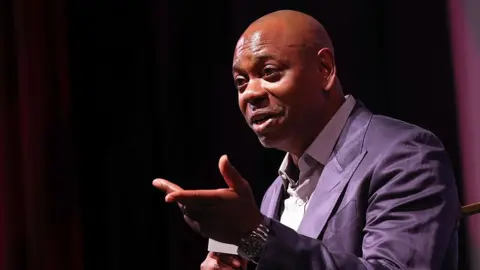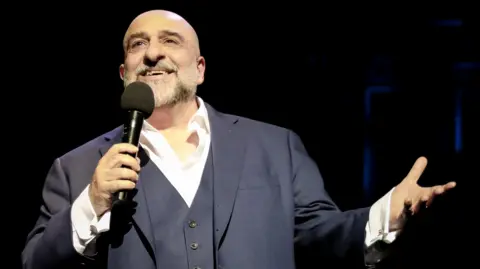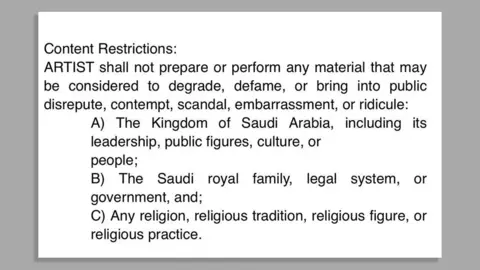Noor NanjiCulture reporter
 Getty Images
Getty Images“There were sex jokes, and trans jokes. It’s really unusual to see this kind of comedy here in Saudi Arabia.”
That’s how one ex-pat summed up the performances she’s seen, at the first ever Riyadh Comedy Festival.
“The response was amazing, I’ve never seen such enthusiasm,” she said, after sets by American stars Dave Chappelle and Bill Burr.
The woman – whom we’re calling Sara – said the comedians avoided discussing Saudi Arabia’s controversial human rights record. But that didn’t particularly bother her.
“People here don’t care about those topics,” she said. “If they did, they wouldn’t live here.”
Outside Saudi Arabia, there are very different perspectives.
Famous comedians such as Jimmy Carr, Jack Whitehall, Kevin Hart, Russell Peters and Omid Djalili have been intensely criticised by fellow artists for agreeing to perform at the festival. Others say they turned down invitations.
But some argued it’s a more nuanced picture. While human rights groups have a host of concerns about Saudi Arabia, the country has attempted to transform its image in recent years.
With the festival in full swing, we’ve been speaking to fans and comedians to find out what’s actually happening on the ground – and how people have reacted.
What’s being said…
The Riyadh Comedy Festival kicked off last weekend, with an all-star – and primarily male – line-up.
One of the first fans through the doors was Zain, not his real name. He attended Omid Djalili’s and Bill Burr’s sets with friends, and is booked in to see Jimmy Carr next week. The sets included “profane content”, with jokes about gay and trans people, he said.
“The opening act for Bill Burr included a ten-minute segment which was all about sex.”
Zain, who lives in Riyadh, said he was shocked to hear jokes like this, in a country which is known for being ultra-conservative socially, and where homosexuality remains illegal. The country imposes the death penalty for same-sex relationships, according to the International Lesbian, Gay, Bisexual, Trans and Intersex Association.
“I can’t believe people were saying this stuff in Saudi,” Zain said. “Many people here haven’t seen a stand-up in their lives, let alone something so explicit.”
 Getty Images
Getty ImagesBut the jokes were well received, he said. “In front of me, [there was a group] of local Saudi women, and they were all laughing.”
Chappelle’s set was also controversial, according to Sara, with lots of jokes about trans people.
She said it’s “really unusual” to hear jokes like that in the Gulf state. “It’s very haram,” she said, using the Arabic word for forbidden.
Zain said that Djalili poked fun at elements of Saudi culture.
“He joked about the niqab, and women driving. He also did a skit about how people in Riyadh think they are god’s gift to earth.”
But Burr seemed much more nervous, he said, and stuck to tried-and-tested jokes about his wife and kids.
The audience was a broad mix of Saudi nationals and ex-pats, and there was a strong turnout, attendees said.
And what’s not being said
Then there’s what’s not being said.
Fans we’ve spoken to said the shows “completely avoided” any mention of the government in Saudi Arabia.
Ahead of the festival, Human Rights Watch argued the festival was an attempt by the Saudi regime to “whitewash” its abuses.
The group warned Saudi dissidents, journalists, and human rights activists were being unjustly detained.
And it urged everyone performing in Riyadh to use the opportunity to speak up on topics such as human rights and free speech.
“So far I’ve not seen one of the comedians raise these issues, not just on stage but on social media or anywhere,” Joey Shea, Saudi Arabia researcher at Human Rights Watch, told BBC News. “It’s very disappointing.”
 X/Atsuko Okatsuka
X/Atsuko OkatsukaComedian Atsuko Okatsuka, who said she turned down an invitation to perform, shared excerpts from a contract that allegedly included bans on any material that could “degrade or defame” the Saudi royal family or religion.
BBC News has not been able to independently verify the existence of such a contract.
But British comedian Rosie Holt says it’s extremely rare for comedians to receive content restrictions like those.
“I’ve only heard it happening sometimes at gigs at universities, like don’t be homophobic or racist,” she told me. “But that’s the exception not the norm.”
‘It’s morally repugnant’
The timing of the festival also hasn’t been lost on its critics.
Its dates, from 26 September to 9 October, coincide with the seventh anniversary of the murder of the journalist Jamal Khashoggi. Khashoggi was killed while visiting the Saudi consulate in Istanbul, Turkey, and his body cut up.
A US intelligence report found Saudi Crown Prince Mohammed bin Salman approved his murder. Saudi Arabia has rejected that…









